Reservable Instruments
Restricted Access
Instructions
Time-Sensitive Experiments
General Restrictions:
Client PC Workstation
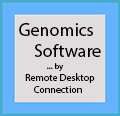
Clients may use this computational resource by Remote Desktop (computer name: lsa-628-client), and that access requires that you have:
When using the Client Workstation PC, you must:
-
Applied Biosystems (ABI) software
- GeneMapper, v5
- MicrobeBridge
- MVF (Minor Variant Finder)
- PeakScanner, v2
- Primer Express, v3.0.1
- Protein Thermal Shift (PTS), v1.4
- QuantStudio·6 qPCR, v1.3
- Sequence Analysis, v6
- Sequence Scanner, v2
- SeqScape, v3
- Variant Reporter, v2
- Bioanalyzer, vB.02.10
- Editseq, v5
- Megalign, v5
- PrimerSelect, v5
- Protean, v5
- SeqMan, v5
- Excel
- OneNote
- PowerPoint
- Word
- Acrobat
- Acrobat Reader
- Photoshop
- Ai (Illustrator)
- NotePad++
- 7-Zip
- PeaZip
- BandiZip
- Chrome
- Edge
- Firefox
Agilent software
DNASTAR Lasergene software (2001)
Microsoft Office365
Adobe
Utilities
Accuris Series Tx (analytical balance)

QuantStudio·6 (qPCR)
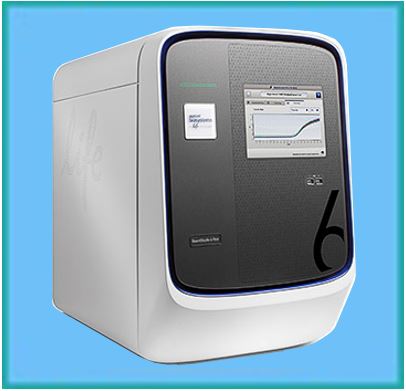
Primers and probes can be automatically designed with Primer Express® software. In addition to the Quick Guides and the complete User Manuals on our website, you can visit the ThermoFisher website to listen to webinars regarding qPCR and our instrument.
SPD1010 SpeedVac
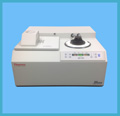 The Thermo Savant SPD1010 SpeedVac is a high
capacity instrument for efficient processing of large batches of DNA or RNA samples.
We have rotors for 1.5 ml microtubes and for 96-well plates.
Typical applications include concentrating DNA extractions and removing low concentrations of
non-agressive organic solvents (methanol, ethanol, acetonitrile) from samples. Faster drying
can be achieved by setting the temperature to 65oC, and the drying chamber’s automatic
bleeder valve prevents sample loss when stopping the rotor.
The Thermo Savant SPD1010 SpeedVac is a high
capacity instrument for efficient processing of large batches of DNA or RNA samples.
We have rotors for 1.5 ml microtubes and for 96-well plates.
Typical applications include concentrating DNA extractions and removing low concentrations of
non-agressive organic solvents (methanol, ethanol, acetonitrile) from samples. Faster drying
can be achieved by setting the temperature to 65oC, and the drying chamber’s automatic
bleeder valve prevents sample loss when stopping the rotor.
Qubit 4.0 (fluorometer)
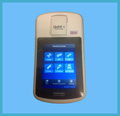 The Qubit 4.0 can be used to quantify dsDNA, ssDNA, RNA, and proteins. This instrument can also be used to assess RNA integrity. All Qubit assays require 1-20 ul of sample, resulting in the quantitation ranges shown with each kit. Samples are analyzed using Axygen 0.5-ml tubes (PCR-05-C, thin-wall, clear). For further information, please see Qubit 4.0 on the Core's Facts & Links webpage.
The Qubit 4.0 can be used to quantify dsDNA, ssDNA, RNA, and proteins. This instrument can also be used to assess RNA integrity. All Qubit assays require 1-20 ul of sample, resulting in the quantitation ranges shown with each kit. Samples are analyzed using Axygen 0.5-ml tubes (PCR-05-C, thin-wall, clear). For further information, please see Qubit 4.0 on the Core's Facts & Links webpage.
Diagenode Bioruptor NGS
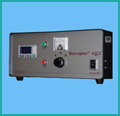 Prior to each use of this 'Reservation-Required' instrument, clients must ask the Genomics Core staff to prepare the system for operation. Staff will also provide instructions for operation of the Bioruptor, guidance on sonication profiles, and empty the system after use.
Prior to each use of this 'Reservation-Required' instrument, clients must ask the Genomics Core staff to prepare the system for operation. Staff will also provide instructions for operation of the Bioruptor, guidance on sonication profiles, and empty the system after use.
To retain the integrity of DNA, Diagenode’s Bioruptor® NGS uses a gentle method of sonication and a chilled water bath to generate indirect sonication waves. As a result, the Bioruptor® produces better and more consistent results than are achieved with harsher sonication methods. Up to 12 closed tubes can be sonicated in parallel and the continuous rotation of tubes allows even distribution of the energy for efficient sonication.
Typhoon 8600 Variable Mode Imager
 The Typhoon™ 8600 Variable Mode Imager is capable of fluorescence and storage phosphor
(chemiluminescence detection can be an option under certain circumstances) detection of
gels and blots. The Typhoon can scan storage phosphor screens (mounted or unmounted),
gels and blots (≤35 × 43 cm). Images can be manipulated with ImageQuant™ Image
Analysis Software; alternatively, users can change the file extension (i.e., *.gel)
to "*.tif" and import the image into other software such as Adobe Photoshop.
The Typhoon™ 8600 Variable Mode Imager is capable of fluorescence and storage phosphor
(chemiluminescence detection can be an option under certain circumstances) detection of
gels and blots. The Typhoon can scan storage phosphor screens (mounted or unmounted),
gels and blots (≤35 × 43 cm). Images can be manipulated with ImageQuant™ Image
Analysis Software; alternatively, users can change the file extension (i.e., *.gel)
to "*.tif" and import the image into other software such as Adobe Photoshop.
Veriti thermal cycler
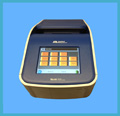 This ABI thermal cycler performs standard PCR, including temperature gradients, and it is protected from brief power outages by an APC backup power supply. Normally, all other thermocyclers in the Genomics Core are reserved solely for use by the Core or members of the Batzer lab; however, you may request permission to use the other thermocyclers if you can plead extenuating circumstances.
This ABI thermal cycler performs standard PCR, including temperature gradients, and it is protected from brief power outages by an APC backup power supply. Normally, all other thermocyclers in the Genomics Core are reserved solely for use by the Core or members of the Batzer lab; however, you may request permission to use the other thermocyclers if you can plead extenuating circumstances.

